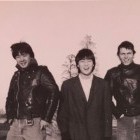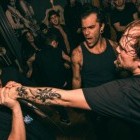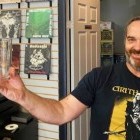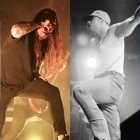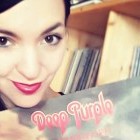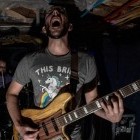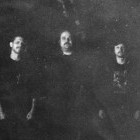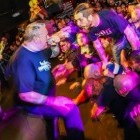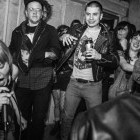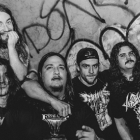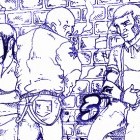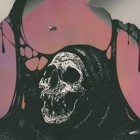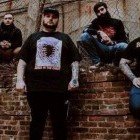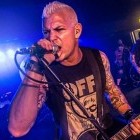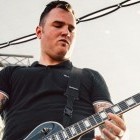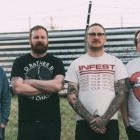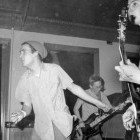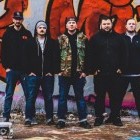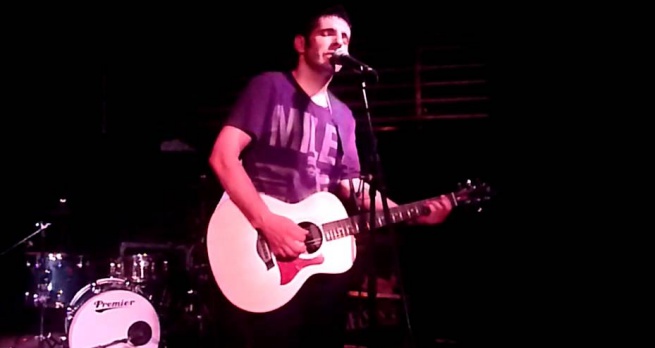
Jonah Matranga has been a working musician since the '90s, back when his former band, Far, released two influential albums: Tin Cans with Strings to You (1996) and Water & Solutions (1998). Both records helped pave a way for such bands as Finch and Glassjaw. Matranga has also released a clutch of records as onelinedrawing, his solo pen name. On the band front, the singer-songwriter has also fronted New End Original (feat. members of Texas Is the Reason, Chamberlain) and Gratitude (feat. members of The Stereo, Crumb), issuing music both through major and indie labels throughout the years.
After reuniting with Far in 2010 for the album At Night We Live, Matranga has since mainly charted a solo course, playing shows all over the world.
In this new interview, Matranga speaks frankly about past musical experiences, and shares some of the highlights and let-downs he's had to date.
You were born in Massachusetts at the end of the ‘60s, and lived there till you left for college in the late ‘80s. What was your childhood like there, were you the rebellious type?
Very much so. I’m actually working on a book about all this stuff right now. It’s got me all reflective. It was a pretty crazy childhood. We were really poor early on. I did more drugs from 12-16 than most people will do in their lives. And broke a lot of windows. And set a lot of things on fire.
What kind of music did you align yourself with in high school?
I was everywhere, really. I was in a breakdance crew, and rocking Zeppelin covers in my friend’s basement.
SEE ALSO: 2016 interview with Connor Lovat-Fraser (Boys Night Out).
Tell me about the solo recordings you started doing while you were a student at Pitzer College in Southern California.
While my friends practiced guitar and all that, I was just obsessed with making songs. I got my first 4-track in high school, and by the time I was in college, I was writing crazy drum machine parts and making all sorts of epic shit. I spent way more time on that than I did on schoolwork.
You set out for Sacramento, California after college and formed Far there. Was there a specific reason you chose that city?
No, I’d never even been there or anything. I just met [bassist] Malcolm [O'Keeffe] through mutual friends, and he was getting a band going in Sacramento, so I gave it a try. I slept on his bedroom floor that first summer.
Did you have a clear vision of what you wanted Far to sound like? What were you listening to at that time?
We had super-different influences. [Drummer] Chris [Robyn] loved Billy Idol, Malcolm was into prog-rock and such, [guitarist] Shaun [Lopez] was into hardcore and heavier stuff. We all loved Zeppelin, though, so we just wanted to make music that was dynamic and adventurous.
What was it about Shaun Lopez that made him your perfect musical partner in Far? Was it an instantaneous connection?
I wouldn’t say Shaun and I were perfect for each other, and it wasn’t instant. Honestly, we were all pretty young, didn’t really know what we wanted beyond just making music that interested us. We really never settled in. All that said, and maybe because of our differences, we made some music that I still really love.
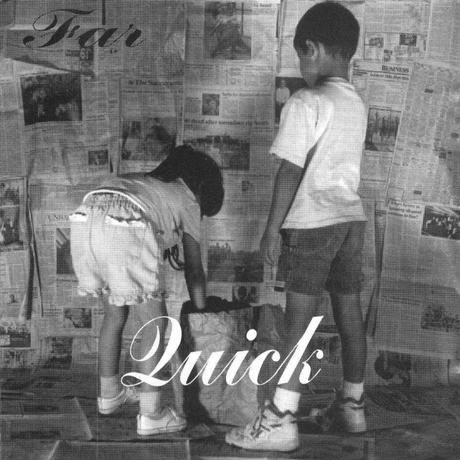
The first Far album that came on my radar, along with most people, was your third, Tin Cans With Strings to You. That one was released in 1995 on Immortal Records, a label that was distributed by Epic. What are your thoughts on the first two Far albums?
Oh, they have their moments, I guess. We were just exploring, trying to figure it out. Quick is a lot closer to the band we became.
Far’s next album, Water & Solutions (1998), is my favorite release from the band. Former Barkmarket vocalist/guitarist Dave Sardy produced that one. He’s also worked with Oasis, Slayer, and LCD Soundsystem, among other artists, through the years.
Yea, that’s my favorite too. Working with Sardy was incredible. He was tough in the best ways. He made our songs tighter, he got great performances out of us, he was calm no matter how stressed we’d get. I feel really lucky that we got to work with him before he got too busy. We were all into Barkmarket, and especially that insane first track on L. Ron. We wanted the record to be huge and lo-fi/hi-fi like that.
SEE ALSO: 2014 interview with Jon Bunch (Sense Field, Reason to Believe, Further Seems Forever).
The opening track on Water & Solutions is “Bury White,” a song whose lyrics always intrigued me. Can you share the story behind that one?
Thanks. I like those lyrics. I’m not sure exactly what’s happening, but it’s something about how we doom ourselves while we’re obsessing about worshipping idols and dominating everything around us. The title actually came from Sardy about how the lyric "soothe me, lover" sounded like Barry White, and that was the working title for a while, and then Bury White was the perfect middle place.
Why did Far break up in 1998?
We were always a little stressed as a band, and lots of touring with mixed results took its toll. I had really different needs than everyone else because I was a young father. I also had some songs arriving that I loved, and they didn’t. I wanted to just take a break to make a little pop album, and it seems like that freaked Shaun out, and we broke up at the end of that tour.
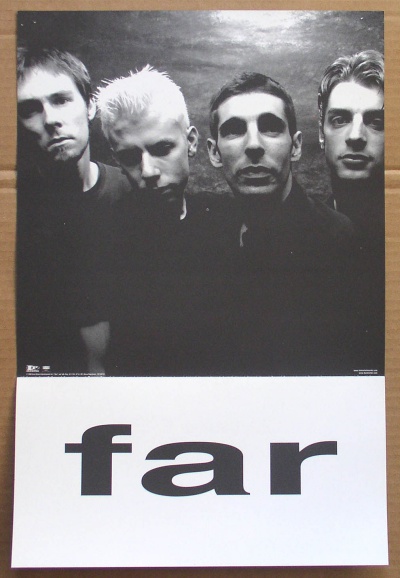
After Far split up, you focused on your solo project, onelinedrawing, for a while, eventually releasing splits with Rival Schools and Sense Field. Stylistically, the songwriting and performance approach was clearly less “aggro” as the stuff you did in Far. Was that important to you at that point?
It wasn’t really important for me to be more or less anything. I kind of think it’s all the same thing, really. I did enjoy the freedom of being solo, though. I really just follow the songs around. Whatever ideas interest me, I just do my best to make them real.
2000 saw you form New End Original with Norman Brannon (Texas Is the Reason, Shelter), Charlie Walker (Chamberlain), and Scott Winegard (Texas Is the Reason, Fountainhead). That band’s sole album, Thriller (2001), featured a song called “Lukewarm” that I felt should have been a huge crossover radio single.
I love that song, still sing it all the time. Would’ve been cool to hear it on the radio, right? Coke wanted to use it in a big ad campaign, that would’ve helped I’m sure. And made us some money. But I said no. I didn’t like the idea of someone coming to a show because they heard us in a soda commercial. I know that sounds really old-fashioned, with all the indie bands selling their music to the highest bidder these days, but I’m still happy with the choice.
Why didn’t New End Original continue on after Thriller?
We broke up on tour, too. Charlie and Scott quit suddenly, it was a bummer. Norman and I thought about playing with new people, but it never really felt right. The New End record started as a onelinedrawing record. I had all the songs written. Looking back, I kind of wish it had just stayed that way. Oh well.
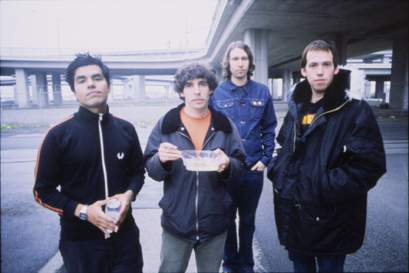
The label that released the New End Original stuff, Jade Tree, signed onelinedrawing and ended up releasing two of your albums: Visitor (2002) and The Volunteers (2004). Since you had more of a budget on those records, did you approach the material any differently than the earlier recordings? You had Dave Sardy come in and do some work on the latter album.
Oh, Sardy just mixed a few songs that he liked for free, just to be cool. I still didn’t have any real budget, and I still made most of the music at home, especially Visitor. I did a couple sessions in the home studios of Will Quinnell and [Rival Schools guitarist] Ian Love for The Volunteers, and Ian played some incredible guitar. On that one, it was really just a matter of having songs that were asking to be bigger and louder, not about having more money or anything. It sure was great having Jade Tree promote and distribute them, though. They did such a good job.
That brings us to Gratitude, a band you sang lead vocals in that also included Jeremy Tappero (The Stereo, Attention), Mark Weinberg (Crumb), Bob Lindsay, and David Jarnstrom (Attention). Were you wary about jumping back into a band situation again?
Yeah, I wasn’t sure how it would go, I just wanted to give it a try. Mark is an incredibly enthusiastic person, it’s kind of intoxicating. We got signed really easily, in a really organic way. It felt right. And then it all went to shit. Again, in hindsight, probably should have just stayed solo.
The self-titled Gratitude album from 2005 featured some of the biggest melodic hooks of your discography to date. “Drive Away” and “Dream, Again” are incredible songs. How do you feel about those songs, and how was it working with producer Jim Scott (Wilco, Tom Petty)?
Yeah, I really love some of those songs, and working with Jim Scott was amazing. He made the studio as relaxed and beautiful as it could possibly be. He literally had road cases full of tapestries and lights and everything, and he put them up everywhere. He’s obviously worked with so many amazing bands, and he’s kind and grounded, and he just adores songs. I’d love to work with him again somehow.
The sessions for that Gratitude album had Kenny Aronoff laying down drum tracks on several songs. He’s legendary in musician circles, and is known as one of the go-to session players since the ‘80s. What was it like having him in the studio?
Yeah, Jim got so many amazing people to play. Kenny Aronoff, Matt Chamberlain, Greg Leisz, Patrick Warren. He was friends with everyone, and the studio was buzzing all the time. Wendy from The Revolution stopped by. Mick Jagger walked through the vocal booth. Jimmy Eat World was recording there, Liz Phair was doing a guest vocal with them, Jon Brion was walking around the hallways. We were looking for a new drummer while we were recording, and Dave Krusen came in to try out. I played some songs with him. I played 14-41 with him for fun. It was all ridiculous and wonderful.
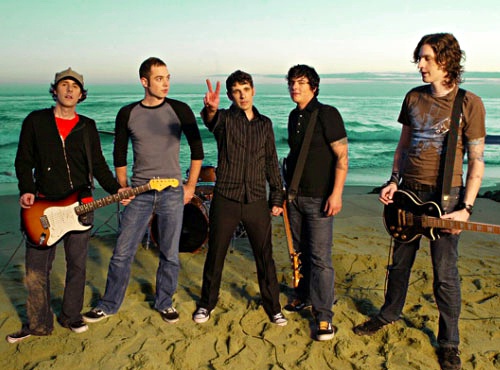
Why did Gratitude end up calling it quits?
Mark quit, and then threatened to sue me if we kept going under that band name. It was a very stressful time, and we didn’t survive it.
SEE ALSO: Best Morrissey and Smiths Rockabilly Songs
You’ve been releasing material under your name now for over a decade. Was there any liberation in that?
Sometimes I think I quit everything a little too soon. Not in a bad way. Anyway, I was burnt on the onelinedrawing idea turning into a bit of a brand as emo got bigger, and too many other singers from bands were starting solo projects, so I went the other way.
Far got back together in 2008 and released the At Night We Live album two years later. Did you feel a sense of pressure delivering a body of songs your fans would be happy with after such a long span of years? After all, it seemed like Far got more popular after you broke up.
I didn’t worry about whether anyone would like it, I just wanted it to be good. I wanted us to try as hard as we could, and make something worthwhile. I think we got there. There are some moments on there that are really special to me, and I actually had a really great time writing and recording with Shaun. We healed a lot of shit. And then he went back to hating me.
I love the way you approach live performances these days. Can you explain that and how you make the logistics work?
Thanks! It’s funny that you ask about the logistics, because it’s really logistics that drive the way the shows go. I have never stopped trying to make things more and more simple and direct. It gives me so much freedom, and I love the creativity that can come from working with limitations.
Last year, I saw you perform at the Jon Bunch Forever memorial concert in Orange County, California. You sang lead on the song “Building” and it was the highlight of the night for me.
My eyes welled up reading this question. I think about him all the time. I just did a guest-DJ thing for a '90s night, and I played a couple of Sense Field songs. When I pulled out my copy of Killed for Less, it had a little note Jon had written when he gave it to me. My eyes welled up then, too. Same with when I walked into the practice studio to run through "Building" with the band. I cried and smiled a lot that day. It was perfect to get to freak out singing such a beautiful, rocking song like "Building." I came back out at the end of "Found You," too. I had to. When I was scared and confused in the early '90s, as Far was getting going and I was getting ready to be a father, Jon said "just show up." Simple phrase, I know, but it meant everything to me right then. It became the center of a song called "Tides" that’s still one of my favorite things I had anything to do with making. I don’t even know how to measure how much I miss him. It’s a lot, though.
This is the part of the interview where I ask you if you had to pick one song from your entire discography that you think best captures the spirit of what you’ve done musically, which one would it be?
Well, maybe because i was just talking about it, but I’ll stick with "Tides." This time next year, I won’t be here. Trying to keep showing up, and walking in the light. Simple, ambiguous mood, lots of room for dynamics and improvisation. Yea, that’s as good a representative as any. Dammit, I’m welling up again. I do that a lot. Like Prince said: always cry for love, never cry for pain. Thanks for asking, and for caring.
***
Head to Jonah Matranga's official website to see everything the singer-songwriter is up to.
Tagged: far, gratitude, new end original, onelinedrawing

